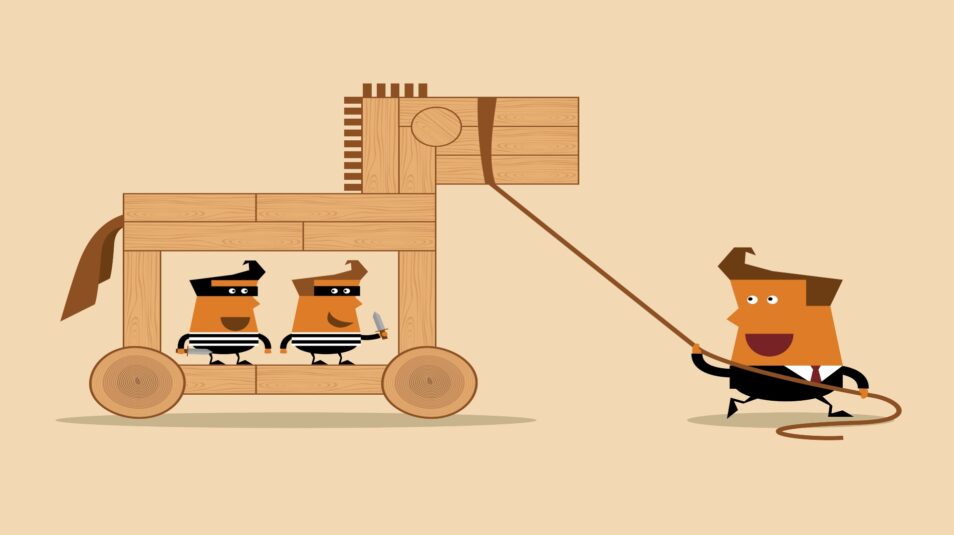Are these Sacred Cows or Trojan Horses?

Leadership
April 5, 2021
John Thurlbeck
Topics
Balance, collaboration, creativity, Excellence, leaders, Leadership, leadership practices, Mythology, preparation, workplace, Workplace CultureLike me, are you fascinated and yet irritated by the mythology that surrounds modern working practices?
By mythology, I mean that growing collection of words and phrases describing working practices that have long lost their true meaning.
Some examples
If you are not sure what I mean, here are a few examples.
- Balance: Disguising indecision as a bland compromise that attempts to achieve many things but ends up accomplishing nothing.
- Collaboration: Creating a culture of learned helplessness with little individual empowerment and accountability.
- Creativity: Wasting time and money coming up with new ideas because it feels good, though not necessarily needed.
- Excellence: Spending too much energy producing perfect work instead of developing the quick-and-dirty solution needed now.
- Preparation: Planning to do work, and usually procrastinating, instead of productively working out just-in-time solutions with just the right resources.
People trot them out like some incontrovertible mantra, assuming everyone agrees with their meaning and application.
However, they are also used to deflect real scrutiny of the meaning behind the words or phrases.
Mythology’s impact on business
In my view, these assumptions plague modern business environments and need elimination. If not stopped, we should all undoubtedly exercise greater caution in their use.
I share this view with Jake Breeden, a leadership coach who wrote Tipping Sacred Cows: kick the bad work habits that masquerade as virtues. His book challenges conventional wisdom.
Breeden believes that there is a significant flaw in leaders who embrace beliefs without understanding and managing their side effects. He further argues that such thoughts eventually become sacred cows, thereby stunting real thinking and learning.
I agree with Breeden’s view, though I would extend it.
My extension of Breeden’s idea
I agree that such assumptions lead to little challenge of their underpinning thinking. However, rather than sacred cows, what if the beliefs were Trojan Horses, hiding an alternate agenda beneath an outwardly benign exterior.
I draw on four examples from Breeden’s book to illustrate my thinking.
- Collaboration - is a modern buzzword of the business world. It implies a strong emphasis on team working and close cooperation between groups and partners. However, I would question whether a team approach is always desirable? Aren’t some tasks better suited to a single competent individual? I sense that people still pursue a collaborative process, even when a singular focus would be better.
- Moving on to another example, consider the notion of Hard Work. It is a highly valued characteristic. However, as Lord Sugar once famously said, “Gerbils work hard; they run around a wheel and get nowhere.” Hard work, therefore, needs focus. Research shows that work, coupled with cleverness, generally creates the most efficient, elegant processes.
- A third example concerns an organisation’s desire for Creativity. Many companies strive to innovate and develop fresh products and services. What we ignore at our peril is, of course, the ‘dopamine effect’. Dopamine is our bodies’ pleasure chemical. It is often released when we find things novel. Note the emphasis on the word novel, as opposed to the word useful. How much sense checking do you do when pursuing creative solutions? Is your solution novel or useful, or novel and useful? Novelty, even in the absence of utility, will give our brains a hit, so please beware.
- My final example is our modern-day fixation on Excellence. Breeden argues that demanding excellence in everything is time-consuming, energy-sapping, and, thus, opportunity destroying. I agree.
A personal example
Drawing on that last example, I share a personal view. I want to become a better me every day. It is my life’s pursuit.
I know it is an iterative process – making incremental improvements consistently, which, for me, underpins excellence.
However, I also know that rough and ready work has been of real value in my journey. By its very nature, it was quick and enabled new ideas to grow and develop into fresh approaches, techniques, and practice. A better me, of course, remains a work-in-progress.
My intent here is to ask you to think a little differently. What other myths can you think of that exist in your current working practices? I’d be delighted to hear of them.






